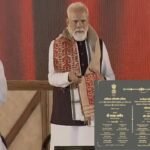Amid rising tensions in Upper Assam, Chief Minister Himanta Biswa Sarma has called upon the people of the state to protest through legal means against illegal encroachments, particularly in districts witnessing heightened unrest. His remarks come after several student and youth organisations reportedly demanded that Bengali-speaking Muslims vacate areas like Sivasagar, Lakhimpur, Tinsukia, and Jorhat. Addressing a public gathering in Guwahati, Sarma acknowledged the growing anger among Assamese people and emphasized that while defending cultural identity is important, all actions must stay within the framework of the law.
“We Must Oppose, But Legally,” Says Sarma
In his speech, Sarma condemned recent instances of violence and warned against taking the law into one’s own hands. “Nobody should take law in their hands but we should protest and agitate in a legal manner,” he stated, underlining that resistance to illegal activities should be firm but lawful. He argued that if Assamese people remain silent, the state’s cultural identity could be endangered. “If we do not raise our voice now, there will be no chance,” he added, calling on citizens to stand up for their rights while respecting democratic norms.

Encroachment in Uriamghat Raises Alarm Bells
Referring to a recent eviction drive in Uriamghat in Golaghat district, Sarma expressed deep concern over the scale of encroachment. Describing the situation as “shocking”, he revealed that thousands of bighas of land have been illegally occupied and converted into fisheries. He assured the public that more evidence and visuals of such large-scale encroachments would be released soon. Stressing the importance of districts like Lakhimpur, Jorhat, and Sivasagar, the CM reiterated that these culturally rich areas must be safeguarded against illegal settlements.
Evictions Continue Despite Political Backlash
Since June, the Assam government has conducted seven eviction drives, displacing over 50,000 people, many of whom claim to be long-settled Bengali-speaking Muslims. The opposition has accused the BJP-led government of creating communal tension and polarising society along Hindu-Muslim lines. In response, Sarma has continued to defend the drives as a systematic effort to restore indigenous land rights, particularly over forest lands, satras, pastures, and public spaces. He insists the moves are essential for protecting Assam’s cultural and environmental heritage.
Balancing Identity and Harmony: A Delicate Task Ahead
While the chief minister assures that the government supports lawful and peaceful protests, the unfolding situation in Upper Assam underscores the delicate balance between identity politics and communal harmony. With growing dissatisfaction among indigenous Assamese groups and increasing scrutiny from civil society and political opponents, the road ahead remains challenging. As the region grapples with issues of migration, land erosion, and demographic change, the emphasis on legal resistance and inclusive governance will be crucial in preventing further social unrest.







